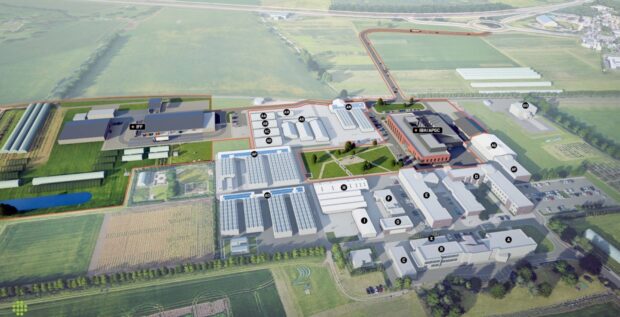The scope, scale and ambition of the new International Barley Hub (IBH) at the James Hutton Invergowrie site was revealed to growers, maltsters, grain merchants and other sectors of the industry last week as the institute moved to raise its profile and put itself firmly on the map.
Stakeholders were given a preview of some of the site’s newest facilities where building work is nearing completion. And with £62 million of funding from the Tay Cities deal being shared between the IBH and the Advanced Plant Growth Centre at the same location, the new offices, labs and sheds will revamp the casmpus.
As part of the upgrade the site has also gained a new main entrance road, giving it easier and more direct access from the A90 – an improvement which JHI chief executive Professor Colin Campbell said would enhance the institute’s visibility and help it escape from it’s reputation of being Dundee’s “best kept secret”.
But as well as the extent of the new facilities – including the new field centre for analysing crop trials and other field work where the meeting was held – those attending were also given an introduction to some of the key researchers and the huge gamut covered by range of scientific disciplines which would, said Professor Campbell be needed to meet the future needs of industry and which could all be delivered at the new facilities.
IBH director, Professor Robbie Waugh said that engagement with the whole of the barley supply chain would be key in ensuring that the needs of the industry were met – and that research was both focused and relevant to meet the needs of the crop which plays a pivotal role in underpinning the burgeoning whisky industry and its key place as one of the country’s key economic drivers.
He said that climate resilience, the need to harness lower input systems alongside expanding markets and outlets for what is Scotland’s most important cereal crop were just some of the areas which would need to be worked on to ensure that trade and research in the crop was future-proofed.
Researchers gave brief presentations on topics as varied as the roles which could be played by molecular genotyping, plant soil interactions through rhizosphere micro-biota, computational biology, and revealed the opportunities offered by wild barley relatives to enhance genetic diversity as well as reviewing the health benefits which can be offered when the grain was used as a foodstuff.
And Professor Waugh added that another key aim of the IBH would be to help establish a new generation of barley scientists operating across the world to help ensure that the crop delivered its full potential.
The hub’s business development manager, Dr Dan Langford added that another key role for the hub would be to act as a platform to promote global collaboration between governments, industry and academia to ensure a sustainable and resilient future beckoned for the crop.
